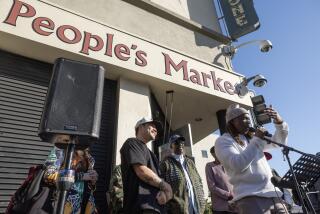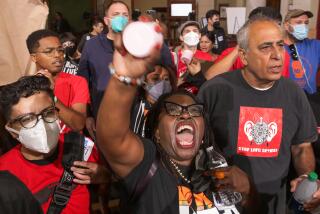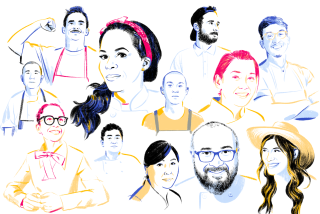Can a dinner conversation — or a hundred — ease racial division?
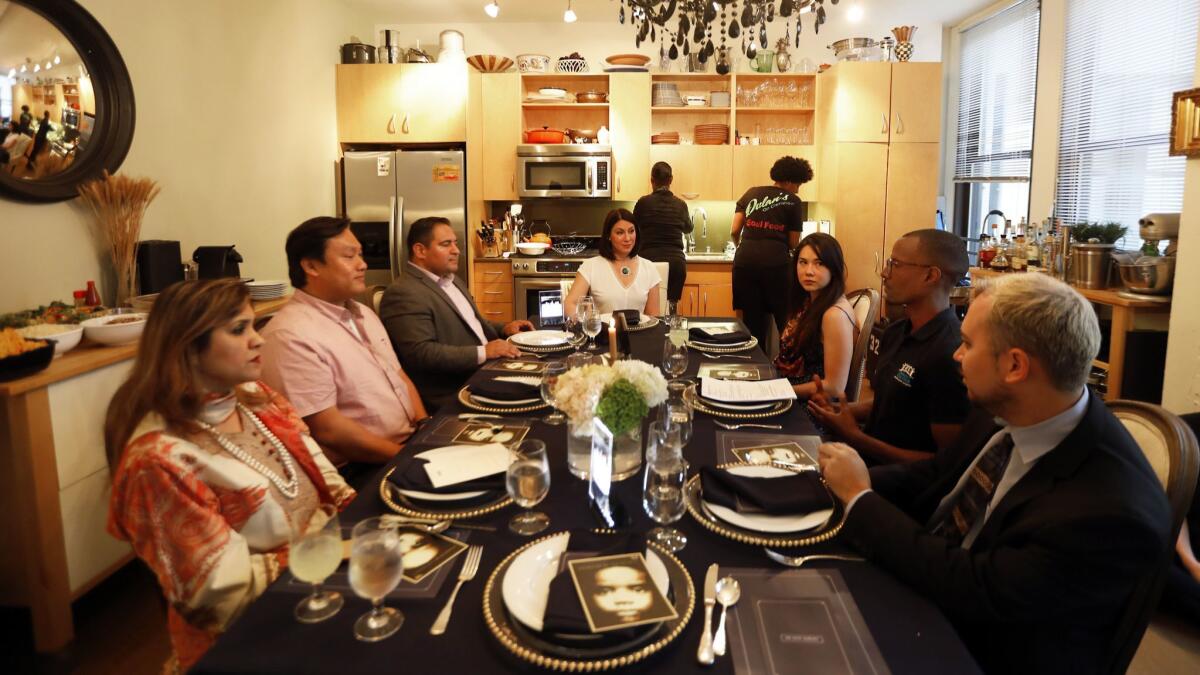
Seven strangers sat at a dinner table in downtown Los Angeles, ringed by reporters jotting down notes, and set out to talk about race.
They included a Muslim physician originally from Pakistan; a Los Angeles transplant who had lived in Canada and Japan and whose family had emmigrated from Taiwan to New Jersey; a bisexual man with Cantonese and Ashkenazi Jewish roots; the Mexican American lobbyist who had welcomed them into her chic apartment; and their facilitator, a black man born in Inglewood who reassured them as they settled in for soul food and a guided discussion.
“I’m not an expert either,” said Anthony Foster, major donor and events coordinator for Community Coalition. “I think we’re all here from a curious place.”
They were brought together by an unusual effort, brokered through City Hall, to “foster understanding, healing and growth.” The initiative, called embRACE L.A., had been championed by one of the most powerful politicians in Los Angeles, who announced last summer that he wanted the city to host scores of intimate dinners focused on race and inequity.

Veronica Perez hosts an embRACE L.A. dinner at her home in Los Angeles.
City Council President Herb Wesson teamed up with Councilman Mitch O’Farrell and Community Coalition, a South L.A. community organizing group once led by Councilman Marqueece Harris-Dawson, to make it happen. One hundred free dinners were held last week as part of a new program funded with $500,000 from the city.
“We have an opportunity to kick-start or ignite a conversation on race that could travel throughout the nation,” Wesson said.
Word spread online. Several people at the downtown dinner said they heard about it through Facebook. Thousands of people signed up to attend dinners throughout the city — twice as many as city officials had initially arranged for, Wesson spokeswoman Vanessa Rodriguez said. A second round of dinners is being planned to accommodate them.
“Los Angeles is a place that sort of prides itself on diversity. How many other places gave birth to Korean taco trucks?” said Manuel Pastor, director of the Center for the Study of Immigrant Integration at USC. “But there’s a lot of social segregation — particularly at a neighborhood level. I think there’s been a hunger for this.”
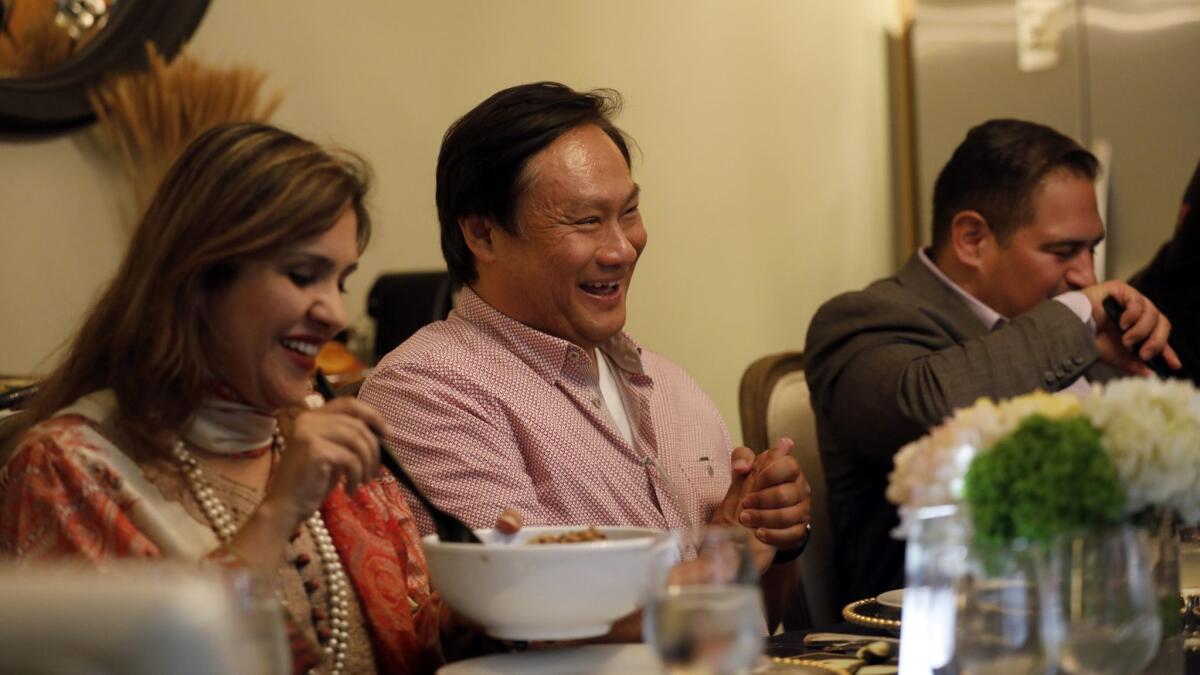
After the dinnergoers introduced themselves, Foster guided the conversation with questions: What did they love about Los Angeles, and what about it caused them pain? How had race shaped their interactions with other people? Had they ever had to have difficult discussions about race?
They talked about the toll of homelessness on daily life in Los Angeles. Why the homeless population seemed to be disproportionately black.
How they felt about giving money to panhandlers. Why so few women hold elected office at City Hall. Islamophobia. Coming out as queer.
That viral video of two black men getting arrested at Starbucks in Philadelphia.
“I think it’s getting worse,” said Amna Qazi, who sits on the city Human Relations Commission. “I would not say better.”
Veronica Perez, the lobbyist hosting the dinner, asked her why. Qazi replied that there was hatred out there, adding, “I hope you guys are not very happy with the current POTUS?”
Laughter rolled around the table. No one volunteered that they were.
Another guest remarked that institutional problems with race had long predated President Trump, and would not go away when he leaves.
Part of the reason that there might seem to be more problems with race now, said Danny Hom, is that social media has spotlighted problems that once were “under the rug.”
“So I don’t know if this just … goes away when the president goes away,” said Hom, who works for a nonprofit that provides solar installation for low-income families.
Los Angeles has tried to bring people together to talk through differences before: Amid stark divisions over the verdict in the O.J. Simpson trial, then-Councilman Mark Ridley-Thomas convened people in what became the Days of Dialogue program. Elsewhere in the country, people have broken bread together in Chicago, Chattanooga, Tenn., Dallas and Wichita, Kan.
But if tough topics aren’t brought up, “it’s a bunch of people sitting around, looking differently, having a kumbaya moment,” said Delores Jones-Brown, professor emeritus at the City University of New York Graduate Center.
Wesson, the first African American to serve as council president, said that face-to-face conversations in college and at church had changed his own outlook, helping him to open up after he suffered racist attacks as a youth. Having the dialogue, in itself, is a victory, he said.
At one dinner last week, Wesson said, he heard one person recount seeing “No Reds” signs barring Native Americans from businesses as a youth. A white woman, in turn, talked about “having the privilege of race never factoring into what she wanted to do.”
“Which was interesting — because race factors into just about anything I want to do,” Wesson said.
In skid row, “the dinner was deep. It was soulful. It was moving,” said Pete White, executive director of the Los Angeles Community Action Network, which hosted a meal for its members and partners. White said people were asked about their grandmothers, and stories ended up stretching back to slavery and sharecropping.
And at a Chatsworth co-working space, dinner host Sonia Smith-Kang said the talk turned to Rodney King, the black motorist whose beating at the hands of police — and the acquittal of the officers — led to one of the most tumultuous periods in Los Angeles history. “Having folks representing Korean Americans and African Americans, to hear each other’s side, that really stuck out to me,” said Smith-Kang, who heads a nonprofit that advocates for the multiracial community.

But even some Angelenos sympathetic to the cause are skeptical that a simple dinner can address deeper issues. Melina Abdullah, a Cal State L.A. professor and Black Lives Matter organizer, said she attended the first dinner with Wesson at his home that became the model for embRACE L.A. Sitting down together for dinner is a good start, she said, but only a start.
“We have to get beyond polite conversation and say, ‘What is your role in dismantling the way in which power structures, especially policing systems, abuse black people, brown people and poor people?’” Abdullah said, pointing to the recent shooting of 30-year-old Grechario Mack at the Baldwin Hills Crenshaw mall.
Another question is who shows up to such dinners and who doesn’t. Smith-Kang said that though her Chatsworth dinner included millennials, baby boomers, African Americans, Korean Americans and people of mixed heritage, “it sounded like everybody was on the same page” on many issues, leaving her wondering how to bring in others who were not.
Foster said that although no one volunteered that they backed Trump at the downtown dinner attended by reporters, there had been conservative guests — and sometimes tenser exchanges — at some other meals across the city. Polling by the Pew Research Center has shown that Republicans and Democrats are much more sharply divided than in the past on questions about racial discrimination and immigrants.

Dr. Amna Qazi speaks about what brought her to the table for the embRACE L.A. dinner party in Los Angeles.
“Americans are really coming to terms with just how bad the polarization is,” said Ange-Marie Hancock Alfaro, professor and chairwoman of gender studies at USC. Part of the problem, she said, is that with the rise of social media, people are drawn into ideological echo chambers.
But Alfaro added that even if people at the dinner table seem to be politically simpatico, talking about race is still important. If Angelenos think that “Los Angeles is a very liberal place, a very diverse place, and therefore they must get the race question right,” she said, they “might end up having a bit of a reality check as they start talking to other folks.”
Wesson added that the dinners would also have a ripple effect, as attendees go back and talk with family and friends who might not have turned out to discuss race with strangers. He plans to sort through their feedback to decide what should come next.
That question was also on the minds of the dinnergoers gathered downtown as they wrapped up hours of discussion over black-eyed peas and baked macaroni and cheese. At the end of the night, they were handed a list of local groups focused on racial justice, immigrant rights, homelessness and other issues that touch diverse communities.
“I hope that we can continue to have these conversations,” Foster told them, “after the cameras leave.”
Days later, Hom reflected on what had been said and what had not.
He had left the downtown dinner feeling grateful to be heard and recognized as a multiracial person, and knowing that he had heard other people. But he felt they could have pushed harder to talk through tough issues like how policing in L.A. affects black and brown communities.
Maybe, he said, it was hard for their particular group — educated professionals with the privileges that status carries — to name the city as the entity with the power to step up and make institutional change.
He hoped that city leaders, in turn, would take feedback from the dinners and use their power to fix the daunting problems that were discussed.
“I’d like the talk to be translated into action,” Hom said, “for our collective good.”

Tom Chang, speaks on race at the embRACE L.A dinner party in Los Angeles.
Twitter: @AlpertReyes
More to Read
Start your day right
Sign up for Essential California for news, features and recommendations from the L.A. Times and beyond in your inbox six days a week.
You may occasionally receive promotional content from the Los Angeles Times.
